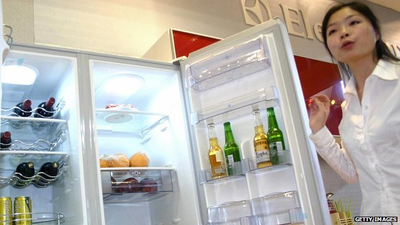Fridgeonomics and a ‘zero waste’ world
After a five-year effort, Unilever tells me that it has achieved zero waste in all of its 240 factories in 67 countries worldwide. It says that it generates efficiency savings of €200m a year by eliminating disposal costs. Smaller businesses like restaurants have aimed for zero wastage, but Unilever – which makes PG Tips and Ben & Jerry’s ice cream – says it’s the first global company to do so.
It’s a fairly remarkable claim and achievement since undoubtedly landfill waste has a huge environmental cost. The UK government estimates that households in England alone generate 177 million tonnes of waste each year.
So, if it’s good for business and the environment, then why hadn’t Unilever and other businesses done this before?
I put that question to Pier Luigi Sigismondi who heads Unilever’s supply chain. He said that the ethos around sustainability has shifted sufficiently to get one of the world’s biggest companies to launch this initiative. Remember that Unilever has had problems with environmental groups; for instance, as the biggest buyer of palm oil. Environmental groups have been concerned with the rate of deforestation in places such as Indonesia due to palm oil extraction. So, the stakeholder pressures appear to be there.
When I asked if up-front capital costs are what puts businesses off, because most are geared for shorter-term returns, Mr Sigismondi pointed out that this was also changing as the biggest companies increasingly recognise the need to address sustainability.

The percentage of households in China with a fridge has soared in the past decade
It’s an issue that came up when we discussed Fridgeonomics on Talking Business this week.
As part of A Richer World season, we peered into people’s fridges to see how consumption patterns are changing with incomes. Refrigerators also contribute to global warming and the rate of refrigeration use is growing rapidly in the emerging world. So, we discussed technologies that use solar power, and other innovations that try to reduce the environmental impact and also allow more of the developing world to have refrigerators even in places with patchy electricity.
Indeed, even with electrification challenges, owning a fridge is a mark of becoming middle class. The top three wish list items for a household emerging from poverty are a TV, a mobile phone and a fridge.
Read full article: http://www.bbc.com/news/correspondents/lindayueh/
